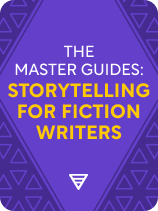

This article is an excerpt from the Shortform book guide to "The Master Guides: Storytelling for Fiction Writers" by Shortform. Shortform has the world's best summaries and analyses of books you should be reading.
Like this article? Sign up for a free trial here.
What does it mean to “write what you know”? Do you make the most of serendipity?
Before you can sit down and write a story, you have to figure out what to write about. Coming up with story ideas can be hard. But, ideas are out there; you just need to know where they can be found and be sure to notice them. We’ve collected tips from several storytelling experts on how to find story ideas.
Read on to get advice from Rob Biesenbach, Stephen King, and Elizabeth Gilbert.
How to Find Story Ideas
In his book Unleash the Power of Storytelling, Rob Biesenbach recommends noticing the stories that play out in your everyday life. You also can interview people about their stories. Alternatively, plumb your own personal history for stories that relate to the message you want to convey. For example, you could call on a childhood memory of building a treehouse to talk about collaboration.
In his book On Writing, Stephen King provides this advice to writers on how to find story ideas: write what you know. However, he’s not referring to what you literally know (otherwise nobody could write about going to Mars). Rather, he means that you should write about the truths you understand—what life feels like, how romance and friendships develop, and the details of your work, for example. You know some unique truths about the world, and these truths will make your writing unique.
In Big Magic, Elizabeth Gilbert (the author of Eat, Pray, Love) asserts that all creative people get their ideas from a mystical or spiritual force of creativity that she calls “Big Magic.” According to Gilbert, Big Magic is always trying to leave clues to help you in your creative pursuit. All you need to do is look out for these clues.
Gilbert writes that clues can take the form of coincidences, items of beauty, dreams, feelings of déjà vu, and other strange occurrences that interrupt usual daily life. For example, imagine you’re traveling by bus in a foreign country and accidentally get off at the wrong stop on your way to an attraction. You wander down empty streets with no idea of where you’re going or how to get back home. Suddenly, you come upon a magnificent ancient structure. It’s unlike anything you’ve ever seen and immediately makes you think of a panel of your graphic novel about the ancient world that you haven’t quite been able to get right. This apparent accident was Big Magic leaving you a clue.

———End of Preview———
Like what you just read? Read the rest of the world's best book summary and analysis of Shortform's "The Master Guides: Storytelling for Fiction Writers" at Shortform.
Here's what you'll find in our full The Master Guides: Storytelling for Fiction Writers summary:
- How to capture and communicate emotional magic through fiction
- Advice from successful authors and storytelling experts
- The five steps of writing a story, from ideating to publishing






